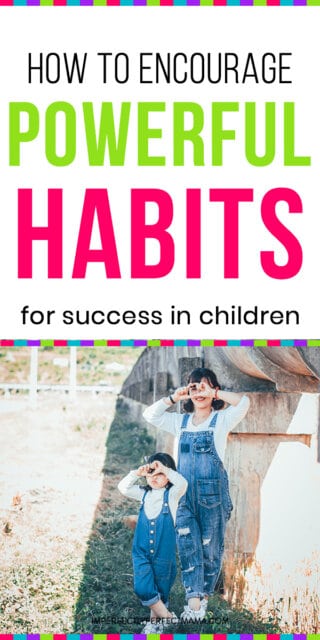Being a parent is a massive responsibility, isn’t it?

You are tasked with guiding your children to develop good habits.
Simply because they are the keys to lifelong success.
Research states that it takes 66 days for a new habit to stick.
So, you have to be both creative and strategic to grow powerful habits in your kids.
One simple way is to tie the new habit that you are trying to build to an existing one.
For example. If you want your kids to start the day with a few simple stretches, link them to brushing their teeth.
So after they brush their teeth, they do 10 stretches.
Over time, it will become a habit.
What is a Powerful Habit?
A habit is an activity that you do daily. A powerful habit is one that shapes your life choices.
For instance, eating a healthy breakfast every day is likely to make you make other healthy choices in your life like daily exercise or meditation.
Examples of Simple Habits
• Doing chores
• Saying please and thank you
• Walking the dog
However, as a parent, your duty is to to go beyond physical habits like these. What you want is to grow lasting values in your kids which will give them the foundation for a successful life.
7 Powerful Habits to Develop in Children

Here’s a list of seven awesome habits that will give your kids the best start in life
1. Silent Sitting and Deep Breathing
Children today are faced with so many choices and pressures. As a parent, you need to strengthen their core values so that they can make choices that are right for them.
Silent Sitting
One way to develop a positive and healthy mindset is through the daily practice of silent sitting. It is a simple guided relaxation exercise.
The Institute of Sathya Sai Education(HongKong) states that you should get your child to:
focus on slow, steady breathing or even to visualize a silver-white light moving steadily through their bodies, bringing relaxation and positive thoughts wherever it touches.
Start by setting a timer for one minute of silent sitting and follow it with a fun activity. Gradually increase the time to 5 minutes. The best way to win your kids over is to sit in silence with them. Teach them the right posture and show them how to do deep breathing while sitting silently.
The benefits of regular silent sitting and deep breathing are amazing. In essence, it is a kind of inner listening and your child will show a wisdom lacking in other kids his age. They are sure to be more:
• Confident and focussed
• Tolerant and understanding
• Kind and compassionate
• Creative and intuitive
Deep Breathing
The main advantage of deep breathing is that it floods the body with oxygen. This, in turn, enables the brain to function better which enhances your child’s ability to focus and concentrate.
You can expect to see improved grades if your child embraces the habit of silent sitting and deep breathing.
2. Reading for Pleasure and Improvement
Are you an ardent reader? Devout readers cannot function effectively if they do not get their reading fix for the day.
Your kids are more likely to become readers if you read regularly.
Reading is such an important habit to cultivate in your kids. Timing to grow this habit is everything. The earlier you start, the greater your success is likely to be.
A bedtime story when the kids are young is easy. It is often a special time that both you and your child look forward to. But you want this to be a sticky habit.
So carve time in the day for family reading. A great way to grow the habit is to start with an audiobook for the whole family to listen to. The attention span of your kids is likely to be very short at first. Increase the time slowly.
Another sneaky way to encourage reading is to get them to read the book on which a movie is based before they actually see the movie.
If you have tweens and teens, you can expect to encounter resistance. Encourage them to read a magazine or a self-help book and then progress to novels.
Encourage a healthy exchange about the book when they’re done. You may want to keep a log to encourage the reading habit.
There are multiple benefits of regular reading. It:
• Develops language and comprehension skills
• Broadens their life experience
• Encourages values such as empathy, compassion, and kindness
Make going to the library an exciting event. Allow your kids to choose books they would like to read. But at the same time, guide them to select books about different cultures.
and countries. This will expand the world view of your kids.
3. Storytelling
Storytelling is a simple but powerful habit to build into your child’s daily routine. This involves telling a story from memory not reading a story.
An easy way to get started is to tell their story. Start with your decision to have a baby to the pregnancy to the funny movements of the baby in the womb and the birth.
Dramatize it with lots of one day when I did this or ate that (highlighting likes or dislikes of the child in the present) and focus on how the baby reacted. Relate the story so that the unborn baby becomes a living character. Kids love it when they are the main characters of the story.
You could also tell the story of your grandparents.
This will help your child to get to know his family history and ultimately, he will learn the importance of family.
You could combine story reading with storytelling. Select books that allow for engagement with the characters. Bring the story to life by:
• Acting out key parts
• Singing and using sound effects
• Getting the kids to dramatize parts they love
• Leaving out phrases and getting the kids to fill them in
• Using appropriate facial expressions and body language
Storytelling is a wonderful habit to cultivate in your kids as it brings them so much pleasure. Research is clear that kids who can tell stories are confident, imaginative, creative and good at problem-solving. Academically, they excel as they are able to concentrate better and stay on task for longer.
4. Active Listening
This is an invaluable soft skill to develop in your children. Active listening means giving 100% of your attention to the person speaking. Teach kids to show that they are engaged by:
• Maintaining eye contact
• Not interrupting
• Asking relevant questions (tell me more about ……
• Repeating a point made ( so you’re upset with …..
• Nodding in agreement
This habit leads to the growth of other desirable values like respect, empathy, and tolerance.
At school, kids who practice active listening excel. They are able to concentrate well, stay on task and work independently.
A simple way to develop this habit is by playing a game like Simon Says. (Simon says stand on your right leg and raise your left arm). Helping in the kitchen and reading and recalling recipes is another way to build this skill.
5. Exercise
Sometimes, you’re too tired to cook and it’s easy to just order pizza for dinner.
But kids today seem to do a lot of sitting – at school, and at home watching TV, playing video games and using computers. This is a health disaster waiting to happen.
You need to get your kids to reap the benefits of playing outdoors so that they avoid the health problems that come with a sedentary lifestyle.
If you want to develop a more structured routine, this may help you to get the kids off the couch and exercising more:
• Stretches as soon as they get up
• A family walk/run before dinner
• A light yoga workout to a Youtube video a few days a week
Maximize exercise in the weekend with lots of outdoor activity – flying a kite, a walk on the beach or bike riding.
Line up fun activities that boost the heart rate and stretch the muscles. Outdoor exercise classes work well too.
For more ideas on the benefits of exercise for kids, read 6 Ways to Make Exercise Fun for Your Kids and Get Them Moving.
6. Volunteering
Do you volunteer regularly? That is the best way to get your kids to embrace the habit of giving back. If you help out with chores at your church, take them along to see it in action.
From an early age, teach them helpfulness. In the home, teach them that chores are a way to help the family work better. Show them the little ways they can help – carry groceries in after a shop, setting the table for dinner, wash the car and so on.
Once the kids have mastered helping out at home, get them to help neighbors. Perhaps you have an elderly neighbor who needs to be cheered up. Encourage your kids to visit with you to spend some time with them.
Other examples of kindness:
• Draw a picture for sick children in hospital
• Run errands for neighbors
• Take an extra sandwich to school for a needy child
• Once a month or so, do a family volunteering project like
• helping out at a soup kitchen or taking part in a clean-up of a park.
Volunteering is character building. It makes kids less selfish, more compassionate and caring. These can only be winning qualities in the workplace later in life.
7. Journaling
Journaling is a wonderful chance for free expression and creativity. This is perfectly doable even if your kids are young and cannot read or write yet.
The idea is to go beyond a simple record of where they went and what they did. It may start that way but encourage your kids to paint, draw, or just use a sticker to document their feelings.
Get started by splurging on craft items like colorful stickers and paints, colored pens and pencils, felt pens and cutouts and a few notebooks.
Schedule time in the day to journal. If you have older kids, you may want to use writing prompts to avoid boredom with journaling. For example, if it’s a snow day, and you’re stuck indoors, you could prompt the kids to write about what they would love to do if it was a no snow day.
There are multiple benefits to journaling. It:
• Boosts creativity
• Grows confidence
• Allows kids to discover their likes and dislikes
• Helps with problem-solving
The biggest advantage of the habit of journaling lies in the troublesome teen years, Teenagers experience so many physical and emotional changes that journaling would be a good way to process all this and find a way to cope.
Do you have tips on other habits that boost success in life? Share them in the comments below.




Leave a Reply